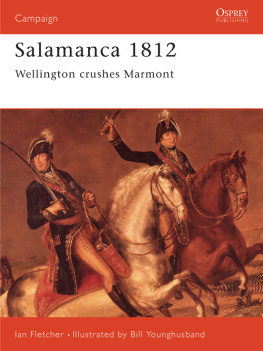Voices from the Peninsula

A Greenhill Book
First published in 2001 by Greenhill Books, Lionel Leventhal Limited
www.greenhillbooks.com
This edition published in 2016 by

Frontline Books
an imprint of Pen & Sword Books Ltd,
47 Church Street, Barnsley, S. Yorkshire, S70 2AS
For more information on our books, please visit
or write to us at the above address.
Copyright Ian Fletcher, 2001
ISBN: 978-1-84832-804-4
PDF ISBN: 978-1-47388-480-9
EPUB ISBN: 978-1-47388-479-3
PRC ISBN: 978-1-47388-478-6
All rights reserved. No part of this publication may be reproduced, stored in or introduced into a retrieval system, or transmitted, in any form, or by any means (electronic, mechanical, photocopying, recording or otherwise) without the prior written permission of the publisher. Any person who docs any unauthorized act in relation to this publication may be liable to criminal prosecution and civil claims for damages.
CIP data records for this title are available from the British Library
Printed and bound in Malta by Gutenberg Press Ltd
INTRODUCTION
The Spanish call it, la Guerra de Independencia, or War of Independence. The French call it, la Guerre dEspagne, the War in Spain. In Britain, the war that was fought in Spain, Portugal and southern France between 1807 and 1814 is called the Peninsular War. Whatever one chooses to call it the war remains one of the most successful campaigns in the history of the British Army. Fought between the armies of France on one side and the Allied armies of Britain, Portugal and Spain on the other, it proved to be Britains greatest military contribution to the downfall of Napoleon Bonaparte. Britain, of course, did not enter the fray until 1808 but by 1814 its army had fought its way from the Lisbon to Toulouse, where the war ended in April of that year.
There are, of course, no living survivors of the Peninsular War. Old soldiers from World War II and post-1945 conflicts are alive today, as are a dwindling band of men from the Great War of 191418, and it is from these old warriors that we continue to receive first-hand accounts of the fighting that took place, accounts that help lift the fog of war. Historians of more distant conflicts have no such luxury. Instead, they are forced to rely upon the published and unpublished letters and diaries of the participants, of official documents and other archival sources. The Peninsular War is no different, for no one alive today can really know what it was like to fight under Wellington in the Peninsula, and thus we are forced to turn to the men themselves, and their letters and diaries.
This book takes us back to August 1808, when the British Army first set foot on Portuguese soil. It was from here that they began a march that was to end hundreds of miles away in southern France. We will follow this march, stopping every now and then to listen to the men who fought under Wellington. We hear how they stormed mighty fortresses and won great victories, we hear of their hardships, of the retreats, and of the mile after endless mile that they marched back and forth across the Iberian Peninsula until they finally drove the French over the Pyrenees and back into France. We then hear about the final push for victory that came at Toulouse on 10 April 1814. We also hear about the infamous sortie from Bayonne, executed by the French four days after Toulouse, a needless sortie that resulted in over 1,500 French and Allied casualties.

The Peninsular War was not only a very successful campaign for the British Army but it was one that prompted a great flood of memoirs, written by Wellingtons men. This was due to a combination of an increase in literacy amongst British soldiers coupled with the fact that after years of under-achievement they finally had something worth writing about. In fact, accounts of the war began to appear almost as soon as the war had begun. The Corunna campaign, with its tragic ending, naturally inspired more accounts, whilst Wellesleys return to Portugal in 1809 similarly prompted an increase. Accounts appeared regularly throughout the war and continued after it had ended. But it was, perhaps, the appearance in 1828 of the first volume of William Napiers A History of the War in the Peninsula, that really opened the floodgates. Napier, himself a veteran, proved a master with the pen and his dramatic descriptions of the battles and sieges captured the imagination not only of the British public but of veterans also. It has since become one of the great masterpieces of English literature. The 6-volume work inspired scores of other veterans to put pen to paper in order to recount the war as they saw it. Some of these accounts were, sadly, simply rehashes of Napier, whilst others drew heavily from his history. But there were many more accounts, written by veterans, which provided a hungry readership with gripping accounts of what happened between 1808 and 1814. Many of these remain equally vivid today, whilst others are merely rare and highly collectable, their contents being mundane and often dry.
Eye-witness accounts of the war are still published today, having lain undiscovered in family vaults or in dusty archives since they were deposited there by their authors. All of these tend to add to our knowledge of the Peninsular War, for no matter how boring they may seem there will always be one small phrase or sentence that unlocks a hitherto unknown secret. Some of the correspondents in this book are well known to students of the Peninsular War, whilst others remain relatively obscure. But all have been chosen with care in order to bring to life the great events that took place in the Peninsula. We ourselves will never really understand what it was like to fight beneath the broiling Spanish sun, to endure the miseries of the Corunna and Burgos retreats, or to face the volcano at Badajoz. Nor can we ever begin to understand what it was like to share in the great triumphs at Vimeiro, Salamanca, and the Nivelle, or how it felt to have stumbled upon the great treasures found amongst the French baggage after Vittoria. We can, however, tap into a rich vein of literature, inspired by the Peninsular War and written by the men who did know. After all, these were the men that lived through it, that fought there and saw their comrades die there. These are the Voices from the Peninsula.
Many thanks go to Tim Edwards, for the loan of items from his extensive collection of Peninsular War literature, and to Brian Ambler, for the loan of other items.
Ian Fletcher, 2001
THE PENINSULAR WAR
Britains involvement in the Peninsular War began in July 1808 when a small British force, no more than 9,000 men, sailed from Cork to the Iberian Peninsula. The force was commanded by 39-year-old Sir Arthur Wellesley, Under Secretary of State for Ireland. Wellesley, who had gained a fine reputation for himself following his campaigns in India, had been busy during the summer with many things, including a feasibility study on the possibility of resurrecting British ambitions in South America, ambitions that had been so shamefully terminated following John Whitelockes disastrous attack on Buenos Aires the previous year. The quest for the new El Dorado would have to wait, however, for in June 1808 Wellesley received new orders. Instead he was to sail to Portugal, where events were moving on at a fast pace since the November the previous year when French troops under General Andoche Junot had invaded the country. They had marched through Spain on the pretext of enforcing Napoleons so-called Continental System, whereby European nations were forbidden to trade with Britain, his hated nation of shopkeepers. Thus denied their valuable trade he hoped to starve and bankrupt them into submission but in order to accomplish this he needed to control every one of Europes ports. The Portuguese, to their immense credit, refused to comply with Napoleons wishes and so he despatched Junot with an army of 30,000 men with orders to seize the Portuguese royal family and implement the new system.

















